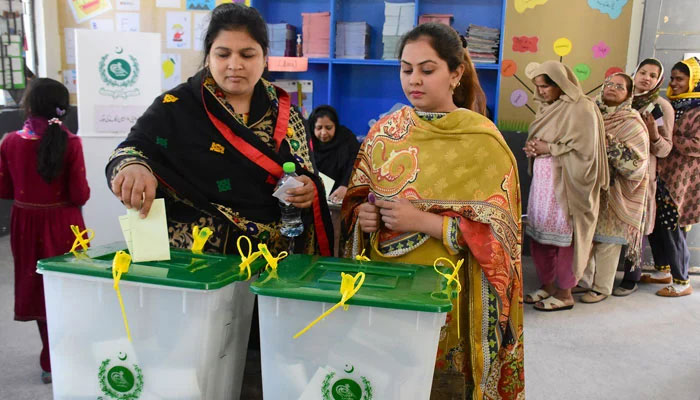What women want
With more women playing an active role in country’s politics, leaders have started acknowledging their voices
Women voters in Pakistan have always been seen from behind the shadows of men. Traditionally, electoral politics used to focus solely on men’s demands. But a lot has changed over the years. With more women playing an active role in the country’s politics, leaders have started acknowledging their voices. According to a report by the Free and Fair Election Network (Fafen) released on Sunday, women voters’ choice in 18 per cent of communities – in the jurisdiction of male and female polling stations – differed from that of their male counterparts in last year’s general elections. Fafen’s analysis, titled ‘Women’s Voting Choices: Significance and Impact on Electoral Outcomes’, compared results from male and female polling stations within the same communities. “In 18 per cent of the communities, male and female voters diverged in their choice of winner as they returned different winners from their respective polling stations", Fafen said.
Fafen’s analysis has its limitations since there is no official gender-wise breakdown of voting patterns. But the findings are enough to give some perspective to political parties. According to the analysis, of the 3,884 communities where women’s choice of winner for National Assembly seats was different, the PTI won more support from women in 1,260 communities, followed by the PML-N in 1,027 and the PPP-P in 694 communities. The trend shows that parties have a lot more to do to meet the needs of women. While the PTI and PML-N had a close run, the PPP is far behind – although to its credit the party has done a few commendable things this term, including the introduction of a women-only bus service to make commuting relatively easy for women. It should be a learning opportunity for parties to figure out how they can meet the bar set by these voters.
Women’s voices in Pakistan are often drowned out by men who see them as a nuisance. Women who raise a voice against the discrimination they face are forced into silence. From digital to physical security, living in Pakistan is a huge challenge for a lot of women. During election campaigns, while political leaders promise jobs and an overall strong economy, they rarely mention the initiatives they have in mind to empower women, who comprise around 50 per cent of the population. Every other day, we hear news of women being assaulted in parks, on the streets, and inside their homes. Every other day, we come across the tragic news of a woman being killed by either her husband or by her in-laws. We have to end this cycle of abuse and torture. Our women are an important part of our society, and we have to make an environment where women can feel safe and heard. It is time for our leaders to ask themselves: ‘what do women want?’ when drafting their agenda/manifesto.
-
 Kim Kardashian And Lewis Hamilton Make First Public Appearance As A Couple At Super Bowl 2026
Kim Kardashian And Lewis Hamilton Make First Public Appearance As A Couple At Super Bowl 2026 -
 Romeo And Cruz Beckham Subtly Roast Brooklyn With New Family Tattoos
Romeo And Cruz Beckham Subtly Roast Brooklyn With New Family Tattoos -
 Meghan Markle Called Out For Unturthful Comment About Queen Curtsy
Meghan Markle Called Out For Unturthful Comment About Queen Curtsy -
 Bad Bunny Headlines Super Bowl With Hits, Dancers And Celebrity Guests
Bad Bunny Headlines Super Bowl With Hits, Dancers And Celebrity Guests -
 Insiders Weigh In On Kim Kardashian And Lewis Hamilton's Relationship
Insiders Weigh In On Kim Kardashian And Lewis Hamilton's Relationship -
 Prince William, Kate Middleton Private Time At Posh French Location Laid Bare
Prince William, Kate Middleton Private Time At Posh French Location Laid Bare -
 Stefon Diggs Family Explained: How Many Children The Patriots Star Has And With Whom
Stefon Diggs Family Explained: How Many Children The Patriots Star Has And With Whom -
 ‘Narcissist’ Andrew Still Feels ‘invincible’ After Exile
‘Narcissist’ Andrew Still Feels ‘invincible’ After Exile -
 Shamed Andrew ‘mental State’ Under Scrutiny Amid Difficult Time
Shamed Andrew ‘mental State’ Under Scrutiny Amid Difficult Time -
 Bad Bunny's Super Bowl Halftime Show: What Time Will He Perform Tonight?
Bad Bunny's Super Bowl Halftime Show: What Time Will He Perform Tonight? -
 Where Is Super Bowl 2026 Taking Place? Everything To Know About The NFL Showdown
Where Is Super Bowl 2026 Taking Place? Everything To Know About The NFL Showdown -
 Chris Pratt Explains Why He And Katherine Schwarzenegger Did Premarital Counseling
Chris Pratt Explains Why He And Katherine Schwarzenegger Did Premarital Counseling -
 Drake 'turns Down' Chance To Hit Back At Kendrick Lamar At Super Bowl
Drake 'turns Down' Chance To Hit Back At Kendrick Lamar At Super Bowl -
 Sarah Ferguson Had A ‘psychosexual Network’ With Jeffrey Epstein
Sarah Ferguson Had A ‘psychosexual Network’ With Jeffrey Epstein -
 Miranda Kerr Shares The One Wellness Practice She Does With Her Kids
Miranda Kerr Shares The One Wellness Practice She Does With Her Kids -
 Czech Republic Supports Social Media Ban For Under-15
Czech Republic Supports Social Media Ban For Under-15




